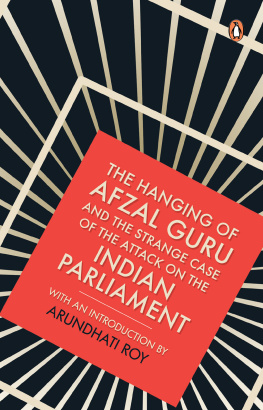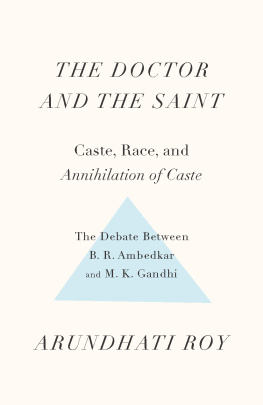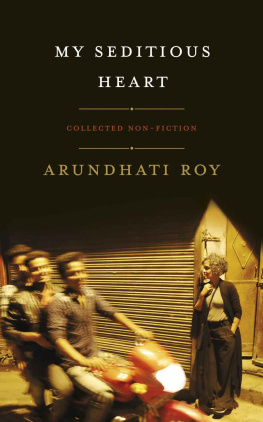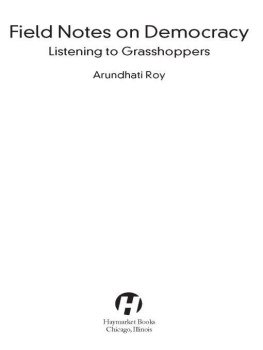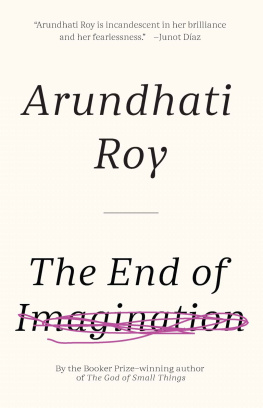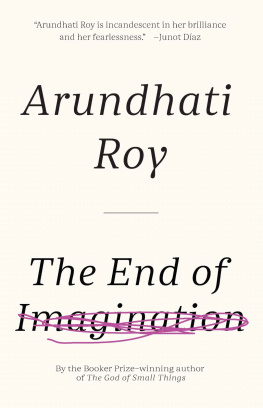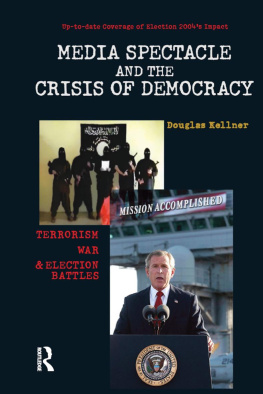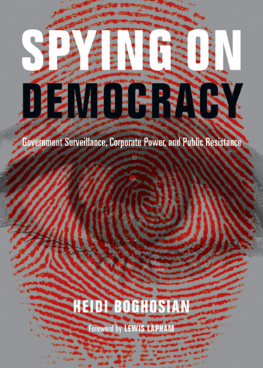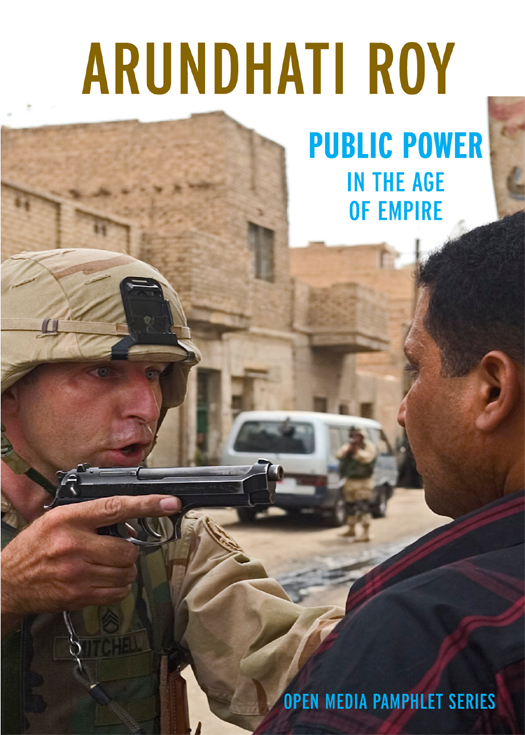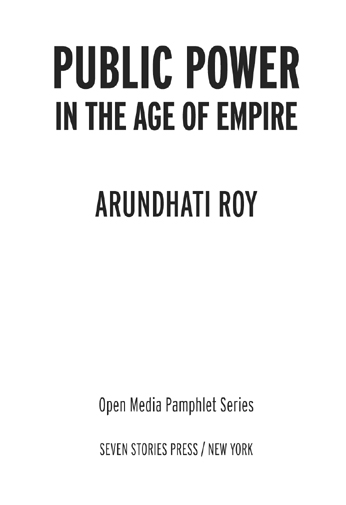Copyright 2004 by Arundhati Roy
Open Media Series Editor: Greg Ruggiero
A Seven Stories Press First Edition
All rights reserved. No part of this book may be reproduced, stored in a retrieval system, or transmitted in any form, by any means, including mechanical, electric, photocopying, recording or otherwise, without the prior written permission of the publisher.
Seven Stories Press
140 Watts Street
New York, NY 10013
www.sevenstories.com
In Canada:
Publishers Group Canada, 250A Carlton Street, Toronto, ON M5A-2L1
Library of Congress Cataloging-in-Publication Data
Roy, Arundhati.
Public power in the age of empire / Arundhati Roy.A Seven Stories
Press 1st ed.
p. cm.
eISBN: 978-1-60980-294-3
1. Government, Resistance to. 2. Power (Social sciences) 3. Imperialism. 4. TerrorismIndiaPrevention. 5. War on Terrorism,
2001- I. Title.
JC328.3.R68 2004
320.95401ldc22
2004021833
College professors may order examination copies of Seven Stories Press titles for a free six-month trial period. To order, visit www.sevenstories.com/textbook, or fax on school letterhead to (212) 226-1411.
v3.1
Contents
When language has been butchered and bled of meaning, how do we understand public power? When freedom means occupation, when democracy means neoliberal capitalism, when reform means repression, when words like empowerment and peacekeeping make your blood run coldwhy, then, public power could mean whatever you want it to mean. A biceps building machine, or a Community Power Shower. So, Ill just have to define public power as I go along, in my own self-serving sort of way.
In India, the word public is now a Hindi word. It means people. In Hindi, we have sarkar and public, the government and the people. Inherent in this use is the underlying assumption that the government is quite separate from the people. This distinction has to do with the fact that Indias freedom struggle, though magnificent, was by no means revolutionary. The Indian elite stepped easily and elegantly into the shoes of the British imperialists. A deeply impoverished, essentially feudal society became a modern, independent nation state. Even today, fifty-seven years on to the day, the truly vanquished still look upon the government as mai-baap, the parent and provider. The somewhat more radical, those who still have fire in their bellies, see it as chor, the thief, the snatcher-away of all things.
Either way, for most Indians, sarkar is very separate from public. However, as you make your way up Indias complex social ladder, the distinction between sarkar and public gets blurred. The Indian elite, like the elite anywhere in the world, finds it hard to separate itself from the state. It sees like the state, thinks like the state, speaks like the state.
In the United States, on the other hand, the blurring of the distinction between sarkar and public has penetrated far deeper into society. This could be a sign of a robust democracy, but unfortunately, its a little more complicated and less pretty than that. Among other things, it has to do with the elaborate web of paranoia generated by the U.S. sarkar and spun out by the corporate media and Hollywood. Ordinary people in the United States have been manipulated into imagining they are a people under siege whose sole refuge and protector is their government. If it isnt the Communists, its al-Qaeda. If it isnt Cuba, its Nicaragua. As a result, this, the most powerful nation in the worldwith its unmatchable arsenal of weapons, its history of having waged and sponsored endless wars, and the only nation in history to have actually used nuclear bombsis peopled by a terrified citizenry, jumping at shadows. A people bonded to the state not by social services, or public health care, or employment guarantees, but by fear.
This synthetically manufactured fear is used to gain public sanction for further acts of aggression. And so it goes, building into a spiral of self-fulfilling hysteria, now formally calibrated by the U.S governments Amazing Technicolored Terror Alerts: fuchsia, turquoise, salmon pink.
To outside observers, this merging of sarkar and public in the United States sometimes makes it hard to separate the actions of the government from the people. It is this confusion that fuels anti-Americanism in the world. Anti-Americanism is then seized upon and amplified by the U.S. government and its faithful media outlets. You know the routine: Why do they hate us? They hate our freedoms, et cetera. This enhances the sense of isolation among people in the United States and makes the embrace between sarkar and public even more intimate. Like Red Riding Hood looking for a cuddle in the wolfs bed.
Two thousand and one was not the first year that the U.S. government declared a war on terrorism. As Noam Chomsky reminds us, the first war on terrorism was declared by President Ronald Reagan in the 1980s during the U.S.-sponsored terrorist wars across Central America, the Middle East, and Africa. The Reagan administration called terrorism a plague spread by depraved opponents of civilization itself. In keeping with this sentiment, in 1987, the United Nations General Assembly proposed a strongly worded condemnation of terrorism. One hundred and fifty-three countries voted for it. Only the United States and Israel voted against it. They objected to a passage that referred to the right to self-determination, freedom, and independence of people forcibly deprived of that right particularly peoples under colonial and racist regimes and foreign occupation. Remember that in 1987, the United States was a staunch ally of apartheid South Africa. The African National Congress and Nelson Mandela were listed as terrorists. The term foreign occupation was taken to mean Israels occupation of Palestine.
Over the last few years, the war on terrorism has mutated into the more generic war on terror. Using the threat of an external enemy to rally people behind you is a tired old horse that politicians have ridden into power for centuries. But could it be that ordinary people are fed up with that poor old horse and are looking for something different? Theres an old Hindi film song that goes yeh public hai, yeh sab jaanti hai (the public, she knows it all). Wouldnt it be lovely if the song were right and the politicians wrong?
Before Washingtons illegal invasion of Iraq, a Gallup International poll showed that in no European country was the support for a unilateral war higher than 11 percent. On February 15, 2003, weeks before the invasion, more than ten million people marched against the war on different continents, including North America. And yet the governments of many supposedly democratic countries still went to war.
The question is: is democracy still democratic? Are democratic governments accountable to the people who elected them? And, critically, is the public in democratic countries responsible for the actions of its sarkar?
If you think about it, the logic that underlies the war on terrorism and the logic that underlies terrorism are exactly the same. Both make ordinary citizens pay for the actions of their government. Al-Qaeda made the people of the United States pay with their lives for the actions of their government in Palestine, Saudi Arabia, Iraq, and Afghanistan. The U.S. government has made the people of Afghanistan pay in the thousands for the actions of the Taliban and the people of Iraq pay in the hundreds of thousands for the actions of Saddam Hussein.


